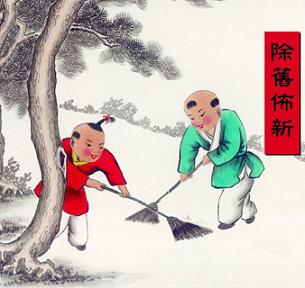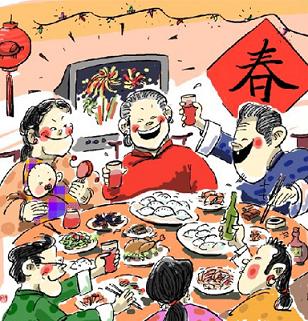
sweeping the dust
掃塵
每年從農(nóng)歷臘月二十三日起到除夕止,我國(guó)民間把這段時(shí)間叫做"迎春日",也叫"掃塵日"。掃塵就是年終大掃除,北方稱"掃房",南方叫"撣塵"。在春節(jié)前掃塵,是我國(guó)人民素有的傳統(tǒng)習(xí)慣。大江南北,到處洋溢著歡歡喜喜搞衛(wèi)生、干干凈凈迎新春的氣氛。
"Dust" is homophonic with "chen"(塵)in Chinese, which means old and past. In this way, "sweeping the dust" before the Spring Festival means a thorough cleaning of houses to sweep away bad luck in the past year. This custom shows a good wish of putting away old things to welcome a new life. In a word, just before the Spring Festival comes, every household will give a thorough cleaning to bid farewell to the old year and usher in the new.
“Dust”與“塵”是諧音(塵在漢語(yǔ)中的意思是舊的和過(guò)去的)。這樣,“在春節(jié)前掃塵”是指徹底清潔房屋掃除過(guò)去一年的厄運(yùn)。此習(xí)俗表達(dá)了收拾舊事物,歡迎新生活的美好愿望。總之,就在春節(jié)到來(lái)之前,為了告別舊年迎接新年,家家戶戶都會(huì)徹底打掃一下房屋。

Staying Up Late on New Year's Eve
守歲
The tradition of staying up late to see New Year in originated from an interesting folk tale. In ancient China there lived a monster named Year, who was very ferocious. Year always went out from its burrow on New Year's Eve to devour people. Therefore, on every New Year's Eve, every household would have supper together. After dinner, no one dared go to sleep and all the family members would sit together, chatting and emboldening each other. Gradually the habit of staying up late on New Year's Eve is formed. Thus in China, "celebrating the Spring Festival" is also called "passing over the year (guo nian)". However, now there are less and less people in cities who will stay up late to see New Year in.
守歲的傳統(tǒng)源自于一個(gè)有趣的民間故事。在中國(guó)古代有一個(gè)叫作“年”的兇猛怪物,在除夕夜“年”會(huì)從地洞里出來(lái)吃人。因此在除夕夜,每家每戶都會(huì)一起吃晚飯,晚飯以后沒人敢睡覺,所有的家庭成員會(huì)坐在一起聊天互相壯膽。逐漸在除夕夜守歲的習(xí)慣形成了,因此在中國(guó),慶祝春節(jié)也被叫作過(guò)年。然而在城市里很少有人以守歲來(lái)歡迎新年。











